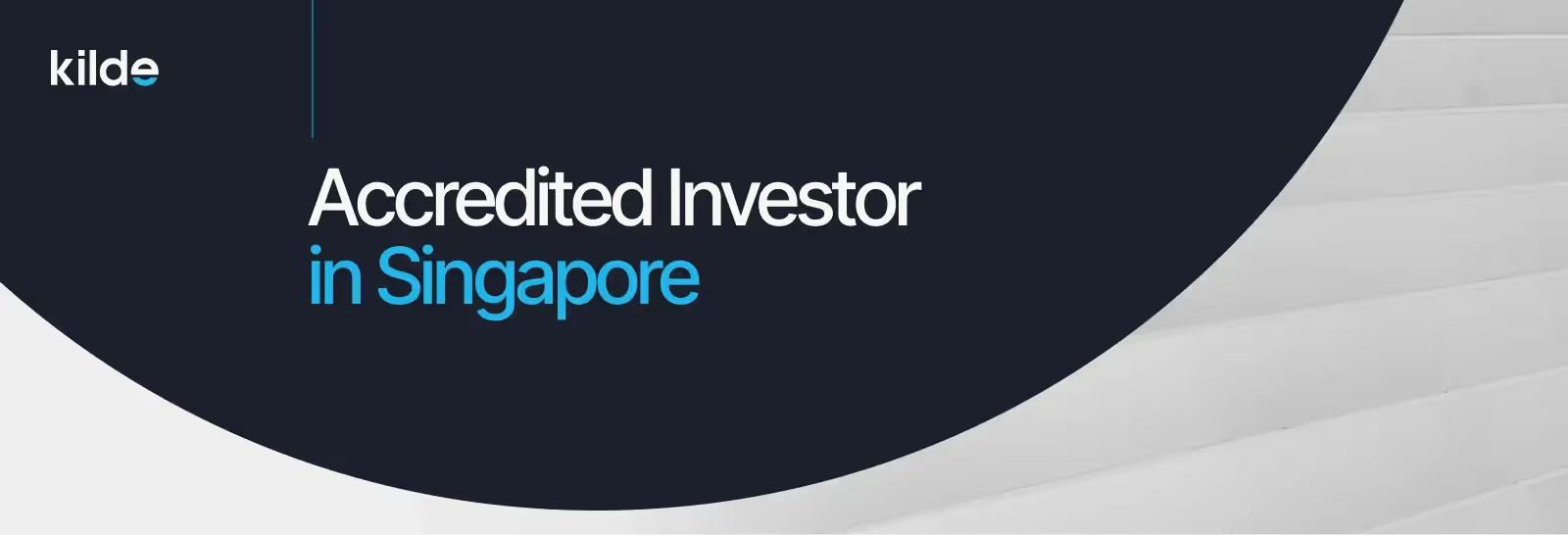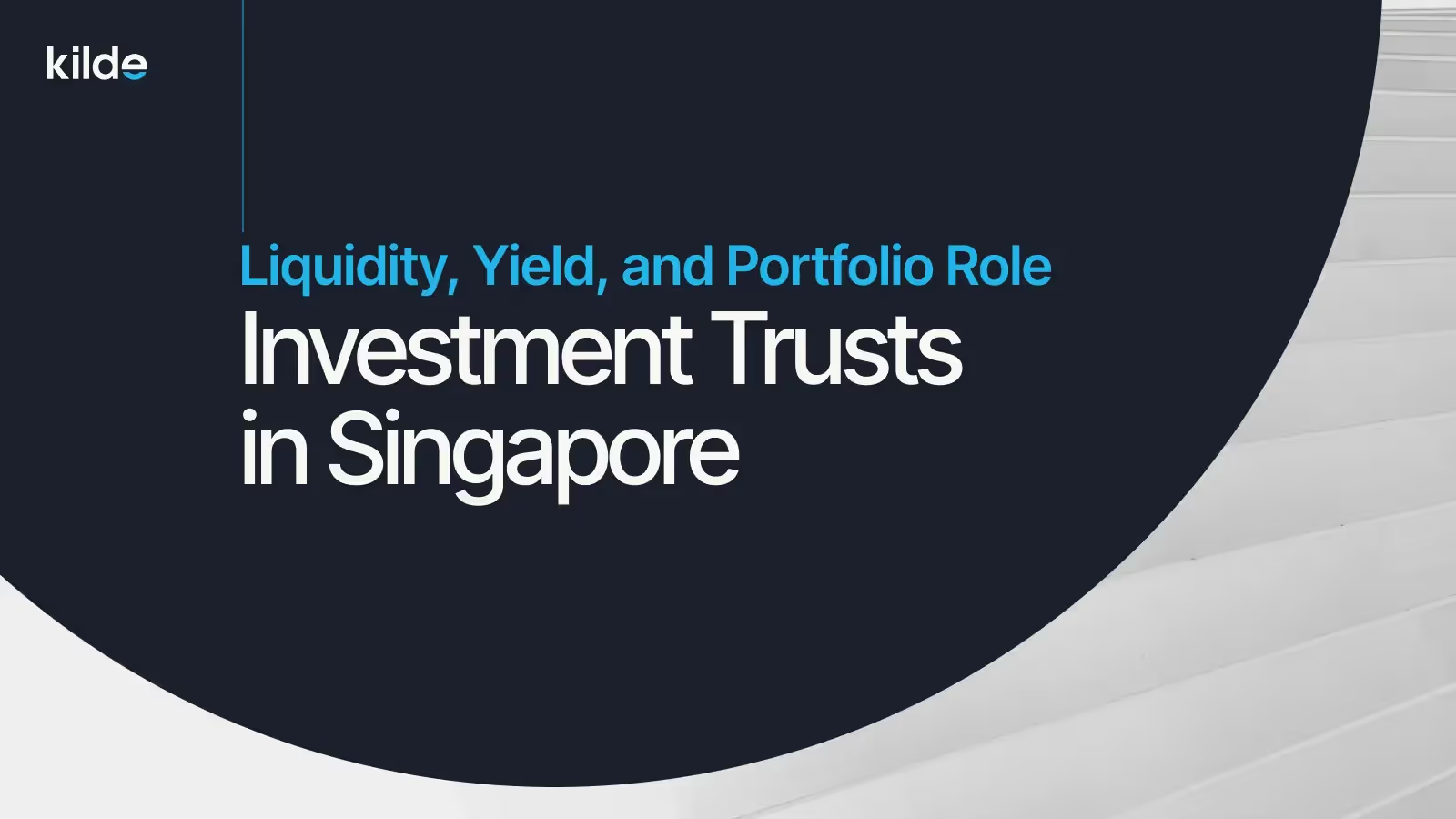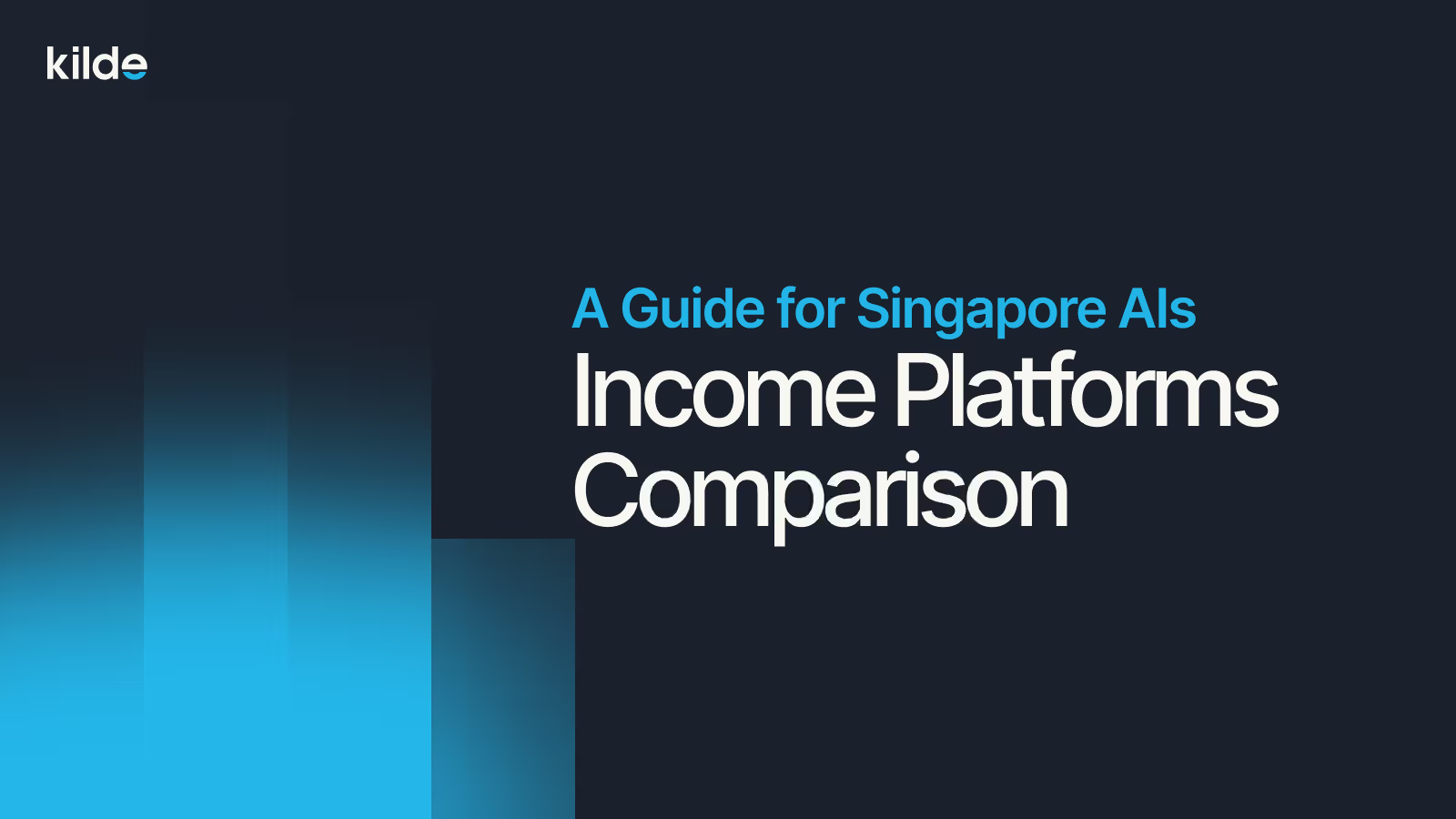An accredited investor (AI) in Singapore is someone who meets MAS financial thresholds and opts in to be treated as an AI, gaining access to products not available to retail investors — such as private funds, structured notes, and private credit.
This guide covers the MAS definition, 2026 eligibility criteria, the exact documents to prove status, the opt-in/opt-out process, and the key pros and cons — plus a practical checklist to get verified.
Definition of an Accredited Investor
An accredited investor in Singapore refers to an individual or corporation that meets specific criteria set by the Monetary Authority of Singapore (MAS).
They are eligible for certain offers that are exempt from prospectus and some conduct requirements, unlike retail investors.
The definition and thresholds are set in Singapore law (SFA s4A) and clarified by MAS guidance.
{{cta-component}}
MAS Accredited Investor Requirements (Eligibility)
For Individuals
- Income: S$300,000 in the preceding 12 months; OR
- Net personal assets (NPA): at least S$2,000,000, of which only up to S$1,000,000 of the primary residence (net of secured loans) may be counted; OR
- Financial assets (net of related liabilities): at least S$1,000,000 (e.g., deposits, specified investments).
For Corporations
- Corporations: Net assets of at least S$10,000,000, based on the most recent audited balance sheet; if audits are not required, a certified balance sheet dated within the last 12 months.
Other eligible persons
Certain trusts and prescribed persons may qualify.
Joint accounts can be treated as AI if at least one holder qualifies and all joint holders opt in for that account.
How crypto (Digital Payment Tokens) count toward eligibility (current position)
When counting Digital Payment Tokens (DPTs) toward net personal assets for Accredited Investor eligibility:
- Apply a minimum 50% haircut to the DPTs’ market value, and
- Cap the amount that can be counted at S$200,000, using the lower of the two values.
MAS-regulated stablecoins are excluded from this DPT haircut and cap rule.
This DPT valuation methodology remains in force for assessing net personal assets.
Transitional re-assessment (now completed)
For DPTs used in AI assessments before 4 Oct 2024, financial institutions were required to re-assess eligibility using this methodology.
The re-assessment deadline (4 Jul 2025) has already passed, and this requirement no longer applies to new assessments.
Scope
This DPT treatment applies specifically to the assessment of net personal assets.
Institutions may apply separate procedures when verifying net financial assets.
Retail vs Accredited vs Institutional Investors (Singapore)
What are the Documents Required for the Confirmation of Accredited Investor Status in Singapore?
These documents are essential for ensuring transparency and compliance with Singapore’s financial regulations.
Most institutions ask for recent (typically ≤ 3 months) statements to verify eligibility; check your provider’s exact requirements.
Provide documents for ONE path below:
If qualifying by Income (≥ S$300,000):
- Last 12 months pay slips
- Latest IRAS Notice of Assessment (or equivalent tax statement)
- Rental/dividend documentation if used
If qualifying by Financial Assets (≥ S$1,000,000, net of related liabilities):
- Bank/custody/brokerage statements (deposits, capital market products, bullion, funds, crypto/DPT)
- Statements of related liabilities (e.g., margin/credit lines used to finance investments)
- Life policy investment statements or certificates of holdings (if applicable)
- Note: apply the DPT haircut (≥50%) and S$200,000 cap when counting DPTs toward net personal assets
If qualifying by Net Personal Assets (≥ S$2,000,000):
- Financial-asset proofs (as above)
- Property ownership docs (e.g., title, latest loan statement)
- Other asset proofs (e.g., vehicles, collectibles); only up to S$1,000,000 of primary residence equity may be counted
Opt-in / Opt-out & verification cadence
Opt-in is required before a provider can treat you as an AI.
Prior transactions made while you were an AI remain unaffected if you later opt out.
Many institutions re-verify eligibility annually, especially for income-based AIs.
You may opt in by written consent and withdraw your Accredited Investor status anytime by notifying your provider in writing. Once processed, your account will revert to retail treatment, but existing investments remain unaffected.
Cross-Border Investments and Investor Protections
While your Accredited Investor (AI) status is defined under the Monetary Authority of Singapore (MAS) framework, overseas accounts are governed by local regulations in the markets where your assets are held.
When investing abroad, note that:
- Investor protection rules differ: Overseas brokers and custodians follow their own client asset regulations and insurance schemes (e.g. SIPC protection in the U.S.).
- AI status is not transferable: Your Singapore-accredited status does not automatically qualify you as a “professional” or “qualified” investor in other jurisdictions.
- Due diligence still applies: Always review the platform’s custody arrangements, account protection policies, and applicable local laws before investing.
This ensures your cross-border investments remain aligned with both MAS requirements and your overall wealth strategy.
When investing internationally, always confirm that both your provider and custodian are regulated in their respective jurisdictions.
Pros and Cons of being an Accredited Investor
While the status grants you exclusive access and potential for higher gains, it also comes with its unique set of challenges and risks.
Here is an exploration of both the advantages and disadvantages.
Pros
- Broader product access (private funds, structured notes, private credit, selected bonds)
- Diversification and strategy fit beyond public markets
- Access to dedicated advisory, curated managers, and deal flow
- Potential for higher returns (not guaranteed)
- Platform benefits (dashboards, consolidated reporting vary by provider)
Cons
- Higher/complex risks (leverage, derivatives, structure/counterparty risk)
- Lower liquidity and longer horizons
- Fewer regulatory safeguards vs retail (exemptions apply)
- Greater due-diligence burden (terms, fees, manager selection)
- Fraud/scam risk due to less standardized disclosure vs public markets
{{cta-component}}
How the process works (4 steps)
Step-by-step verification checklist:
- Check eligibility: Choose one MAS path (income, financial assets, or net personal assets).
- Collect documents: See the checklists above; ensure statements are ≤ 3 months old.
- Submit & opt in: Complete your provider’s consent form; Singpass/MyInfo may prefill income data.
- Verification & access: Approval typically follows document checks; then you can access AI-eligible products.
Closing Thoughts
Becoming an Accredited Investor in Singapore opens the door to a broader investment universe — ranging from private credit and venture capital to bespoke structured products and thematic funds.
This access allows for more sophisticated portfolio construction and potentially higher returns, but it also demands deeper due diligence and a clear understanding of risk.
Beyond investment access, Accredited Investors often enjoy elevated banking privileges and invitations to exclusive market insights or events.
However, the real advantage lies not in exclusivity, but in the ability to make informed, strategic investment choices with a long-term perspective.
For investors seeking to explore regulated alternative investments, platforms like Kilde provide access to carefully vetted private credit opportunities. Each deal is screened for quality and transparency, offering an avenue to diversify while maintaining control over risk exposure.
As always, it’s important to remember that higher potential rewards come with greater complexity.
Accredited Investors should approach opportunities with prudence, a clear grasp of the underlying risks, and, where needed, professional financial guidance.
Sources:
- Monetary Authority of Singapore (MAS). 2024. FAQs on the Definition of Accredited Investor and Opt-In Process. Singapore: Monetary Authority of Singapore.
https://www.mas.gov.sg/regulation/faqs/faqs-on-the-definition-of-accredited-investor-and-opt-in-process - Monetary Authority of Singapore (MAS). 2024. FAQs on the Definition of Accredited Investor and Opt-In Process (PDF, updated October 2024). Singapore: Monetary Authority of Singapore.
https://www.mas.gov.sg/-/media/mas-media-library/20241008_faqs-on-the-definition-of-accredited-investor-and-opt-in-process.pdf - Singapore Statutes Online (Attorney-General’s Chambers). 2023. Securities and Futures Act 2001 (Chapter 289), Section 4A – Specific Classes of Investors. Revised Edition.
https://sso.agc.gov.sg/Act/SFA2001?ProvIds=pr4A- - Monetary Authority of Singapore (MAS). 2018. Securities and Futures (Classes of Investors) Regulations 2018. Singapore: Monetary Authority of Singapore.
https://sso.agc.gov.sg/SL/SFA2001-S882018 - Monetary Authority of Singapore (MAS). 2019. Implementation of the Opt-In Regime for Accredited and Institutional Investors – Circular No. FAA-G04/SFA 04-N13. Singapore: Monetary Authority of Singapore.
- Monetary Authority of Singapore (MAS). 2023. Stablecoin Regulatory Framework. Singapore: Monetary Authority of Singapore.
https://www.mas.gov.sg/news/media-releases/2023/mas-establishes-regulatory-framework-for-stablecoins - Monetary Authority of Singapore (MAS). 2025. Notice on the Treatment of Digital Payment Tokens (DPTs) in the Calculation of Net Personal Assets for Accredited Investor Assessment. Singapore: Monetary Authority of Singapore.
- Monetary Authority of Singapore (MAS). 2024. Financial Advisers Act (Chapter 110), Sections 20 and 23 – Exemptions for Accredited Investors. Singapore: Monetary Authority of Singapore.
- United States Securities and Exchange Commission (SEC). 2020. Amendments to the Accredited Investor Definition. Washington, DC: U.S. Securities and Exchange Commission.
https://www.sec.gov/news/press-release/2020-191 - Investopedia. 2025. “Accredited Investor: Duties and Requirements.” Updated July 25, 2025.
https://www.investopedia.com/terms/a/accreditedinvestor.asp
Regulatory notes: Definitions and thresholds are set out in SFA s4A and Securities and Futures (Classes of Investors) Regulations 2018. MAS’ FAQs on the Definition of Accredited Investor and Opt-In Process (updated 2024) clarify DPT valuation (≥50% haircut and S$200,000 cap), exclusion of MAS-regulated stablecoins, and re-assessment by 4 July 2025.
Disclaimer Notice
This page is provided for general informational purposes only and does not constitute legal, financial, or investment advice. Please refer to our Full Disclaimer for important details regarding eligibility, risks, and the limited scope of our services.
The views expressed in this blog post are solely my personal opinions and do not constitute professional financial advice. I am simply sharing my opinions with no guarantee of accuracy or completeness. No reader should make decisions based solely on the contents of this blog post. Readers should consult their own financial advisor before making any investment decisions. Neither the author of this blog post, Kilde, nor its employees will be held liable for any financial losses or damages that may result from the use of the information contained herein. Investing contains risks, including total loss of capital. Past performance does not guarantee future returns. Please conduct your own research before investing.
FAQ
Yes. Accredited investors gain access to a wider range of complex products — such as private equity, structured notes, or hedge funds — that are generally higher risk and less liquid.
They also receive fewer regulatory safeguards under the Monetary Authority of Singapore (MAS) framework compared to retail investors.
Yes. Non-Singaporean residents may qualify as Accredited Investors if they meet the MAS financial thresholds and submit the required supporting documentation through a licensed Singapore financial institution.
Depending on how quickly documentation is submitted, verification usually takes between 3 and 14 business days.
Platforms using Singpass/MyInfo for income verification may complete the process instantly.
Your Accredited Investor status is reviewed periodically — typically every 12 months.
If your financial situation changes and you no longer meet the criteria, your status may lapse during the next review, though existing investments remain valid.

















